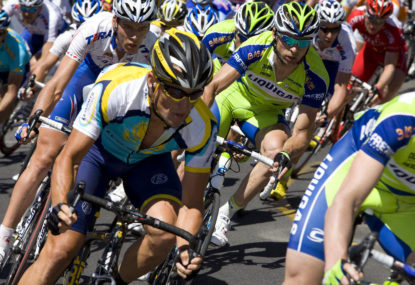JackJumpers' NBL title was special - but where does it sit among Tasmania’s top ten sporting moments?
It’s a pretty good time to be a Tasmanian sports fan right now. After years in the sporting wilderness with not much to celebrate,…

We’ve all heard that post match interview. “I can’t describe how it feels. I’m speechless mate…”
Why we ever expect our sports people to discover the inarticulate speech of the heart at the moment of exhausted triumph has always seemed a little silly to me.
After all, as sports writers, that’s our job!
Great sports writing can take you inside that moment. It can guide you through the heartbreak on the other side of any triumph. It can lead you through the missed opportunities, the fortunate happenstance, the aspiration, inspiration and exasperation that shape any sporting contest.
That is why I find it so compelling. At their best, a great sports writer can trace the contour of the games we love and the people that play them and make it real again on the page.
The first book I ever loved was a sports book. As a 10-year-old, I received a hardback edition of the late Max Walker’s early classic “Tangles”.
For a cricket-mad kid in 1978 camped out amongst the scorched paddocks and the housing commission estates of Melbourne’s northern suburbs, that book became an escape route. I disappeared into its pages over and over again as Max recounted ripping yarns about being a scallywag kid growing up in Tasmania, his time playing VFL footy at Melbourne and his rise up the ranks of Test cricket.
In particular, Max’s recollections of his first tour of the Caribbean mesmerised me. For a kid who hadn’t seen Brighton, let alone Barbados, I was enchanted by his cricket travelogue.
Written in his laconic vernacular, it was if he were telling the story in his own voice.
All these years later, when reading Marlon James’ epic Man Booker Prize-winning novel about the politics and intrigue of 1970s Jamaica, “A Brief History Of Seven Killings”, I felt like I knew a little of the terrain.
Max had taken me there a long time ago.
Some of the best writing about sport isn’t really about sport at all, well not really.
As an Arsenal fan, Nick Hornby’s classic “Fever Pitch” is a fabulous memoir about his life as a Gooner through all that heartache right up to improbable glory. Yet beneath the recollection of infuriating days at Highbury and one incredible night at Anfield, “Fever Pitch” is a book about a young man looking to find somewhere to belong.
Similarly, Chad Harbach’s remarkable debut novel, “The Art of Fielding”, is a dazzling journey through the landscape of baseball.
It’s also an intergenerational love story that deals with complex ideas of sexuality, identity and commitment, while at the same time patrolling the infield like a young gun shortstop.
Knowing that sport is about more than the scoreboard is something the great writers embrace. In Australia, nobody understands this better than Martin Flanagan.
A writer with a unique empathy, Martin sees sport as a meeting place as much as it is a contest. He wants to know who you are as much as how you play because one walks side by side with the other.
Martin’s piece on The Western Bulldogs’ Bob Murphy is a perfect example. It reflects Flanagan’s gift for using sport as a path to something bigger and better than the game itself, however painful the journey might be. In a world full of dark tidings, these words of comfort and sustenance are something many of us need.
There can be no shying away from sport’s struggles with our lesser angles, though. Sport is as much about politics, gender, economics, race and religion as it is about medals and trophies.
It’s the job of the sports writer to be vigilant and relentless in pursuit of uncomfortable truths.
My dear, late friend Rebecca Wilson understood this more than most and had the courage of her convictions, something that set her apart from so many others.
It is also what makes David Walsh such an important writer. Walsh’s exhaustive and relentless pursuit of the truth about discredited Tour de France star Lance Armstrong is the gold standard for sports journalism.
His book about his pursuit of Armstrong, “Seven Deadly Sins”, is a testament to his Herculean battle to discover the truth because the truth mattered.
In fact, his book is a love story of sorts. Walsh’s passion for cycling endured beyond the obscenity of sport’s greatest fraud. He was on a mission to rescue the sport that had given his life a richness and meaning he cherished. The jury may be out right now whether he succeeded, but he hasn’t given up the fight yet.
Each of these writers understood one thing. It’s more than a game. Sport is about who we really are. Their great gift to us is to show us what that actually looks like.
Francis Leach is a sports broadcaster and writer who co-founded and curates the Sports Writers Festival, which runs from October 14-19 this year. You can follow Francis on Twitter @SaintFrankly
Make sure you catch special guests like David Walsh, Gideon Haigh, Martin Flanagan at the Sports Writers Festival running in Melbourne and Sydney. Check out the site for details on tickets and events.